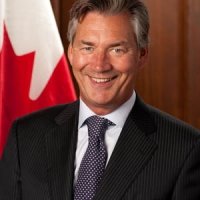Power Partnerships: How Canada-U.S. Hydroelectric Partnerships Reinforce America’s Clean Energy Economy
Power Partnerships: How Canada-U.S. Hydroelectric Partnerships Reinforce America’s Clean Energy Economy
February 25, 2013
Panel 1: Canadian Officials’ Stance on the Canada-U.S. Hydroelectric Partnership
Gary Doer, Canadian ambassador to the United States, began the discussion of the Canada-U.S. hydroelectric (hydro) partnership by recognizing the progress both countries have made in creating clean air and clean water policies and regulations. Emblematic of the two countries’ energy partnership, the Montréal Protocol has reduced more greenhouse gas emissions than the Kyoto Protocol. Despite these successes, Doer recognized that Canada and the United States still have work to do. Canada can take a number of measures to honor its commitment to Copenhagen, including writing new light vehicle emissions rules and aligning heavy trucks and black carbon regulations with U.S. standards. Hydro must be a large part of any future Canada-U.S. plans for reducing our shared carbon footprint. Unfortunately, many states do not define hydro as a renewable energy source. The United States can make the most of the opportunities hydro has to offer by creating hydro policies in tandem with other energy sources, in particular with natural gas. Because it is non-emitting, hydro can be part of a solution to reduce greenhouse gas emissions consistent with the international agreements of which both Canada and the United States are signatories.
Greg Selinger, premier of Manitoba, declared that Canadian hydro ought to be perceived as an essential component for a clean energy strategy in North America. Manitoba, which exports 40 percent of its hydro to the United States, uses sustainable hydro and works with the First Nation to address environmental issues before beginning any project. Hydro is a reliable, long-term source of power, said Selinger. Echoing Ambassador Doer’s remarks, Selinger said that Manitoba hydro has served as a complementary source of power to other sources, such as wind. Partnering with Canada on hydro will provide the United States with energy security. However, to take advantage of these resources, both countries must commit to further integrating and improving the existing power grid. There are fewer east-west linkages than north-south linkages, and transmission is a fundamental part of building sustainable energy. Selinger also recognized that cheap power is fundamental to economic development; Canada must be able to provide the United States with energy at an affordable price. Hydro is especially appealing because it is part of the solution to combat climate change (it is clean, reusable, and emits less of a carbon footprint than other sources), it is reliable, and it is efficient. Concluding his remarks, Selinger described the efforts of the Committee on Canadian Energy Strategy, which while relying on provincial leadership, has set a goal of eliminating the use of diesel from small communities within 11 years.
Panel 2: Stakeholder and Expert Responses
The second panel offered stakeholders and experts a platform to offer advice to promote hydro within the Canada-U.S. relationship. Stephen Molodetz, vice president of Hydro-Québec-US, reinforced statements made earlier that hydro is a renewable energy source. He offered four considerations to promote hydro. His first piece of advice was to avoid the “either-or” mentality because renewable energy is not zero-sum. Second, he cautioned against technological or geographic discrimination, instead advocating letting “science” decide what is renewable. Third, Molodetz voiced concerns with designing renewable incentive programs to achieve multiple and disparate objectives. Finally, hydro companies should include the cost of transmission in their project estimates, because the cost of transporting hydropower from remote regions will add to the costs of production and increase price to consumers.
David McMillan of Minnesota Power recommended that Canada and the United States bolster their grids while creatively connecting renewable sources. Tony Clark, FERC commissioner, noted the interdependencies between Canada and the United States, and stressed, as did Molodetz, that regulators must focus on the bottom-line cost. Richard Caperton of the Center for American Progress identified explained why the United States is not using more Canadian hydro: building new power plants—and finding new markets—is hard. All new generation is challenged by low demand growth, cheap natural gas, and uncertain climate policy. Canadian energy has other challenges, including transmission siting problems, threats to domestic (U.S.) jobs, environmental concerns, and regulatory barriers. Caperton also stated that the way to move the industry forward is for Canadian energy to be a better option than alternatives. Consumers will recognize Canadian energy as the better option when emissions are reduced, power prices go down, and when it has a comparably lower overall environmental impact than alternatives.
Panelists’ final messages:
• Molodetz: Let the science determine what is renewable, and then let the technologies compete on a level playing field.
• McMillan: There is a complementary nature of U.S. renewables and Canadian hydro. Add U.S. renewables by partnering with Canadian hydro.
• Clark: Focus on end-use consumer cost and do what’s right by your consumers.
• Caperton: There are people who do not like Canadian energy, and we should be clear about who they are and how they stand to benefit from the status quo.
Speakers

Former Ambassador of Canada to the United States
Hosted By

Canada Institute
The mission of the Wilson Center's Canada Institute is to raise the level of knowledge of Canada in the United States, particularly within the Washington, DC policy community. Research projects, initiatives, podcasts, and publications cover contemporary Canada, US-Canadian relations, North American political economy, and Canada's global role as it intersects with US national interests. Read more
